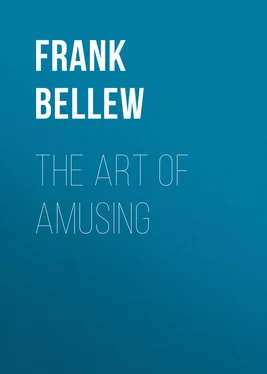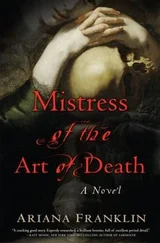Frank Bellew - The Art of Amusing
Здесь есть возможность читать онлайн «Frank Bellew - The Art of Amusing» — ознакомительный отрывок электронной книги совершенно бесплатно, а после прочтения отрывка купить полную версию. В некоторых случаях можно слушать аудио, скачать через торрент в формате fb2 и присутствует краткое содержание. ISBN: , Жанр: foreign_antique, foreign_prose, на английском языке. Описание произведения, (предисловие) а так же отзывы посетителей доступны на портале библиотеки ЛибКат.
- Название:The Art of Amusing
- Автор:
- Жанр:
- Год:неизвестен
- ISBN:http://www.gutenberg.org/ebooks/40309
- Рейтинг книги:3 / 5. Голосов: 1
-
Избранное:Добавить в избранное
- Отзывы:
-
Ваша оценка:
- 60
- 1
- 2
- 3
- 4
- 5
The Art of Amusing: краткое содержание, описание и аннотация
Предлагаем к чтению аннотацию, описание, краткое содержание или предисловие (зависит от того, что написал сам автор книги «The Art of Amusing»). Если вы не нашли необходимую информацию о книге — напишите в комментариях, мы постараемся отыскать её.
The Art of Amusing — читать онлайн ознакомительный отрывок
Ниже представлен текст книги, разбитый по страницам. Система сохранения места последней прочитанной страницы, позволяет с удобством читать онлайн бесплатно книгу «The Art of Amusing», без необходимости каждый раз заново искать на чём Вы остановились. Поставьте закладку, и сможете в любой момент перейти на страницу, на которой закончили чтение.
Интервал:
Закладка:
Punch. "I say, old hoss!"
Showman. "I say, 'old hoss!' Mr. Punch, that's not a very polite way to address a gentleman. Well, what do you say?"
P. "I say!"
S. "Well, what do you say?"
P. "I say!"
S. "Well, you've said 'I say!' twice before. What is it you have to say?"
P. "I say!"
S. "What?"
P. "Nothing particular!"
Mr. Punch dances off, hilariously singing.
S. "Nothing particular! Well, that is a valuable communication."
P. (Stopping again). "Oh, you April fool!"
S. "April fool? No, Mr. Punch, I'm not an April fool. This isn't the first of April."
P. "Isn't it? Well, salt it down till next year."
S. "Salt it down till next year? No, thankee, Mr. Punch. Guess you'll want it for your own use."
P. "Mr. Showman!"
S. "Well, Mr. Punch?"
P. "Have you seen my wife?"
S. "Seen your wife? No, Mr. Punch."
P. "She's such a pretty creature!"
S. "Such a pretty creature, eh? Well, I'd like to be introduced."
P. "She's such a beauty! She's got a nose just like mine" (touching his snout with his little hand).
S. "Got a nose just like yours, eh? Well, then, she must be a beauty."
P. "She's not quite so beautiful as me, though."
S. "Not so beautiful as you? No, of course not, Mr. Punch; we couldn't expect that."
P. "You're a very nice man. I like you."
S. "Well, I'm glad you like me, Mr. Punch."
P. "Shall I call my wife?"
S. "Yes, by all means call your wife, Mr. Punch."
P. (Calling loudly). "Judy! Judy, my dear! Judy! come up-stairs!"
Judy now makes her appearance. Punch draws back and stands gazing at her for a few minutes in mute admiration. Without moving, he exclaims: "What a beauty!" then, turning to the audience, he asks earnestly: "Isn't she a beauty?" He now turns to Judy and asks her for a kiss; they approach and hug each other in a prolonged embrace, Mr. Punch all the time emitting a species of gurgling sound expressive of rapture. This is repeated several times, interspersed with the remarks of Mr. Punch on the beauty of his spouse; after which, at Mr. P. 's suggestion, the couple dance together to lively music and the enlivening tones of Mr. P. 's voice; the performance winding up by Mr. Punch's leaning up against the door of the theatre exhausted and delighted, and giving vent to a prolonged chuckle of gratification.
Punch now turns to the Showman and asks him if he has ever seen his Baby. The Showman replying in the negative, Punch extols the beauty of his offspring in the same extravagant strain as he has already done that of his wife, makes the same comparison between his own and the Baby's nose, declares that the Baby never cries, and that she is " so fond of him ."
The Baby is now ordered to be brought up-stairs, and Judy disappears to obey her lord's mandate. During her absence Punch favors the company with a song. When Judy returns, bearing the infant Punch in her arms, Mr. P. goes into raptures, calls it a pretty creature, pats its cheek, and goes through all the little endearing ceremonies common to fathers. After again informing the Showman that his Baby never cries, and is fondly attached to him, he takes the infant in his arms, whereupon she immediately sets up a continuous howl. Punch tries to hush and pacify it for some time, but at last, losing his temper, shakes it violently and throws it out of the window, or in other words, at the feet of the audience. Judy is of course distracted, weeps bitterly, and upbraids her husband, when the enraged Mr. Punch dives down-stairs and gets his club, and whilst Mrs. P. is still weeping, gives her three or four sound blows on the back of the head. This makes Mrs. P. cry still more, which, in turn, increases Mr. P.'s wrath, who ends by beating her to death and throwing her after the Baby. The Showman upbraids Punch with his crime, but Punch defends himself by saying it served her right. However, he finally admits that he is naturally a little hasty, but then he adds, "It's over in a minute," and that's the kind of disposition he likes. He further adds:
P. "I'm a proud, sensitive nature."
S. "You're a proud, sensitive nature, are you, Mr. Punch? I don't see much pride in killing a baby."
P. "That's because you don't understand the feelings of a gentleman."
S. "Because I don't understand the feelings of a gentleman? Well, if those are the feelings of a gentleman, I don't want to understand them, Mr. Punch."
This dialogue can be carried on to suit the taste and invention of the exhibitor.
Presently, while Mr. P. is recklessly glorying in his crime, declaring that he is afraid of nothing, and laughing to scorn the Showman's admonition, the Ghost makes his appearance close to Mr. P. 's shoulder, and stands there for some time, listening unobserved to Punch's brag. After a while, however, turning round, Punch catches sight of him, and is rooted to the spot with horror for a few seconds; then he retreats backwards, his whole body trembling violently, till he reaches the side of the theatre; here he turns round slowly to hide his face from the awful apparition. When, by turning away, he loses sight of the Ghost for a few seconds, he recovers his voice so far as to say to the Showman in trembling tones: "W-h-h-a-a-t a hor-r-r-rid creature! What an awful creature!" Then he turns round very slowly to see whether the "horrid creature" is gone, but finding it still there, suddenly jumps back – jambs himself up in the corner – pokes his head out of the window, and screams, "Murder! murder! murder!" shaking all the time violently. This he repeats several times, till at last the Ghost disappears. Then Mr. P. recovers his courage and swaggers about as before, vowing he is afraid of nothing, etc., etc.
Now appears on the stage the Constable, who twists himself about in a pompous style for some seconds, and then addressing Mr. Punch, says:
Constable. "I've come to take you up!"
P. "And I've come to knock you down!" (which he accordingly does with his club).
The Constable gets up, and is again knocked down several times in succession. Not relishing this style of thing, however, he disappears and returns with a club, and a battle royal ensues, part of which – that is to say, one round of the battle – shows the skill of the Constable in dodging Mr. P.'s blows, and can be made immensely funny if properly performed. It is done in this way: The Constable stands perfectly still, and Punch takes deliberate aim; but when he strikes, the Constable bobs down quickly, and the blow passes harmlessly over his head. This is repeated frequently, the Constable every now and then retaliating on Mr. P.'s "nob" with effect. Not succeeding with the sabre-cut, Punch tries the straight or rapier thrust. He points the end of his baton straight at the Constable's nose, and after drawing back two or three times to be sure of his aim, makes a lunge; but the Constable is too quick, dodges on one side, and Punch's club passes innocently out of the window. This is repeated several times, till the Constable sails in and gives Punch a whack on the head, crying: "There's a topper!" Punch returns the compliment with the remark: "There's a whopper!" Now they have a regular rough and tumble, in which Punch is vanquished.
The Constable disappears and returns with the gallows, which he sticks up in a hole already made in the stage (four-inch board previously mentioned), and proceeds to prepare for the awful ceremony of hanging Mr. P. Punch, never having been hung before, cannot make out how the machine is intended to operate – at least he feigns profound ignorance on the subject. When the Constable tells him to put his head into the noose, he puts it in the wrong place over and over again, inquiring each time, "That way?" till at last the executioner, losing all patience, puts his own head in the loop, in order to show Mr. P. how to do it, saying: "There! that's the way! Now do you understand?" To which Punch responds, "Oh! that's the way, is it?" at the same time pulling the end of the rope tight, and holding on to it till the struggling functionary is dead, crying all the time: "Oh! that's the way, is it? Now I understand!"
Читать дальшеИнтервал:
Закладка:
Похожие книги на «The Art of Amusing»
Представляем Вашему вниманию похожие книги на «The Art of Amusing» списком для выбора. Мы отобрали схожую по названию и смыслу литературу в надежде предоставить читателям больше вариантов отыскать новые, интересные, ещё непрочитанные произведения.
Обсуждение, отзывы о книге «The Art of Amusing» и просто собственные мнения читателей. Оставьте ваши комментарии, напишите, что Вы думаете о произведении, его смысле или главных героях. Укажите что конкретно понравилось, а что нет, и почему Вы так считаете.












